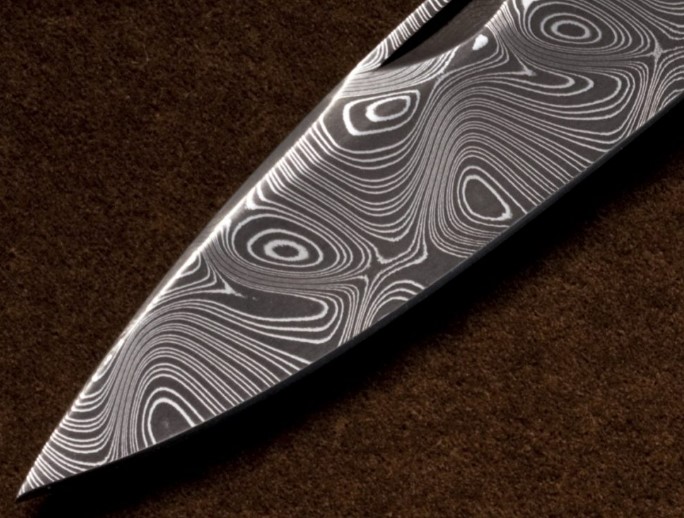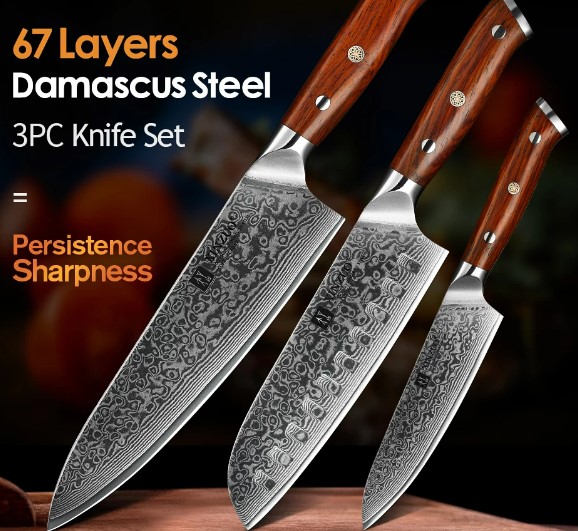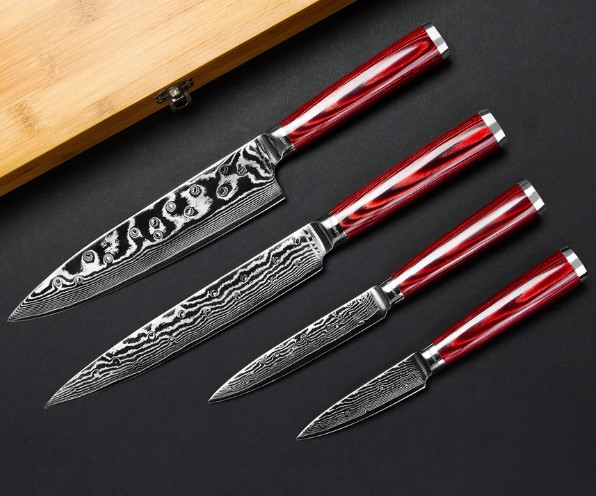Originally posted on August 2, 2022 @ 6:44 am
“Is Damascus Steel Good?” will be the question for most kitchen enthusiasts.
Are you looking for a well-made knife? Damascus steel is what you’re after. It’s been around since the Middle Ages and has been used to make some of the best knives in history. What makes it so great? The answer lies in its durability, resilience, and ability to keep an edge. If that sounds good to you, read on to learn more about this knife material.
Interest piqued? Keep reading! There are many reasons to pick up this knife even if you don’t want a low price point.

Table of Contents
What is Damascus steel?
Many people debate the origins of this steel, but it’s said that wootz steel was first forged in India and traded to Damascus.
Firstly, let’s recap exactly what Damascus steel is. This particular type of metal is created by the forge welding of two different types of steel layered together flat plates heated folded hammered over and over again until more layers are added. Many people debate its origin, but it’s said that Wootz Steel was first crafted in Indian.
Then brought to Syria before making its way through trade throughout Europe, where many high-end weapons were made using this unique material for their construction.
The delicate layers created during manufacturing give Damascus its unique flowing water look and reveal the output tone of voice for this steel.
Now we know what this type of metal looks like and why it’s beneficial for bladesmithing!
Damascus steel has been existing for a long time It’s a type of steel surrounded by the mythology that only adds to its legend after gaining the name from the Syrian capital, Damascus. The actual name of the blade is wootz, but because blades traveled via trade routes with Syria.
They were known for being made in Damaskus or “in-the fashion” of Damaska, making them appear more beautiful than most other swords on earth at a time during war campaigns across Europe. As a result, it became precious materials within armies around Europe, including some samurai clans where some scholars argue their superior sword skills.
Is Damascus steel as good as its reputation? This article will explore this topic.
Is Damascus steel good for kitchen knives?
Yes, the Damasus steel is hard with a more delicate and sharp edge, whihc is the best material for kitchen knives. The layer of steel type lets you softer steel for increasing the flexibility and make it durable.
Damascus Steel Advantages
There are several significant benefits for Damascus steel, including the excellent design and the sharp edge. Let’s check it in detail right below:
This steel is made by layering two different types of steel to make a better sword. One type has high carbon, while the other one has low carbon.
High-carbon steels are hard and can hold very sharp edges, but they also tend to be brittle, which could cause chipping or snapping quickly, whereas Low Carbon Steels have a softness that won’t hold an edge for a long time, but there’ll be much flexibility in them without having any risk of cracking
The quality of a Damascus knife is dependent on the steel used to make it. If two low-quality sheets are used, then the resulting blade will be low too.
The best way to ensure that you’re getting a high-quality piece of cutlery, whether folding or fixed, is to look for one with an HRC rating between 62 and 66 on our Rockwell Scale (steel hardness). Of course, this isn’t always possible, but anything under 50 may not hold up well against everyday wear and tear like cutting meat, among other things.
Is Damascus steel strong?
Before we go into the details of hardness and Rockwell scales, it’s important to note that there are several different kinds of Damascus steel. For example, some types will be more complex than others due to differences in carbon content. So before you can accurately measure a knife’s hardness (which is measured by something called the “Rockwell scale”), make sure you know what kind was used for forging its blade!
In this input passage about Damascus steel knives being hard or soft depending on their type, I have summarized how many different variations exist with regards to these blades’ properties and advised readers not to take any measurements too seriously without knowing more information first. So they don’t get the wrong results!
One way to check how hard a knife is without getting too technical with all the numbers and statistics would be checking the Carbon level. By looking at this number, you can determine what type of steel was used in making your Damascus Knife.
Google search “VG-10 composition,” for example, after finding out which VG-10 knife it is that interests you. Then refer to my chart below of different carbon content levels where I have categorized them into straightforward terms so they are easier to understand.
The Carbon content of VG-10 is 1% and is considered high carbon steel.
| Category | Carbon |
| High carbon steel | >0.9% |
| Medium carbon steel | 0.5-0.9% |
| Low carbon steel | <0.5% |
Why is Damascus Steel so Good?
While Damascus steel is not better than every other type of steel, it does have its unique advantages. Modern-day alloys can replicate the characteristics of this metal without layering two different types together.
There are many benefits to choosing Damascus steel. First, the beautiful pattern created from the layering technique can be one reason people choose it. Second, there’s still a significant benefit when selecting good Damascus steel: only as good as steels used in the forging process.
That doesn’t mean Damascus steel is terrible. On the contrary, modern-day quality steel can be just as solid and beautiful with the pattern created from layering techniques as in old times.
Many people still prefer to buy Damascus for its strength or beauty despite having all of these other options available because it was forged in a traditional way that has passed down through generations which cannot be matched by today’s technology alone.
These days, premium steels are already well balanced between hardness and flexibility. Therefore, forging technique of Damascus is not really needed.
Which is better: Damascus steel vs Carbon steel Knife?
Both knives have pros and cons, but we’ll try not to make this a “versus” debate.
a. Carbon steel knife
Carbon steel knife can cut through food with extreme precision due to their hardness and edge retention properties which make them stay sharp for a longer period of time than others. Carbon blades are also relatively cheaper compared to others. Still, they require regular maintenance for them not to rust since their metal content lacks chromium found on stainless steel utensils.
This increase in brittleness makes high carbon steel more likely to crack under tension. On the other hand, low-carbon steel is much more ductile and tends to bend rather than break, making it easier for people who work with metal or welding in general.
b. Damascus steel knife
Damascus steel is a type of metal that has beautiful, wavy patterns that are its unique characteristic. The ancient technique for making Damascus steel is lost to history, but modern techniques are pretty close today. People buy these knives because they have an exciting past and offer intrigue not found in other conventional blades even though the two types aren’t similar at all anymore. It also makes them works of art due to their brilliant nature where no blade looks exactly alike
Some believe Damascus steel blades have not done enough to be taken seriously and are more famous for their cosmetic value. However, their performance still falls short of a carbon steel blade, some would argue this knife stays sharp longer than others due to these factors.
Additionally, while there has been debate about how strong Damascus metal is compared with other metals like carbon or titanium, it can make an excellent hunting weapon if needed.
Is the Damascus steel magnetic?
Because Damascus steel contains Iron, which makes it magnetic, if you have a magnet, it will stick to the knife; however, Damascus itself does not act as a magnet. Therefore, as long as your knives are stuck in an appropriate block or holder, they should be acceptable for display purposes.
Is the Damascus steel anti-stain?
It’s best to check the composition of your stainless Damascus steel knife before buying it. You should look for a name like VG-10, AUS-10, or VG-MAX if you want a high-quality alloy that will not rust easily and is also easy to sharpen when dulled over time.
Searching Google for the steel type and composition, an example of what I might search is ‘VG-10 composition’.
I would start by looking at its Chromium content to see if it was high or low. The higher, the better because that means there is more chromium in your stainless steel which will help prevent corrosion from happening over time and staining. So any reputable company should be able to provide you with this information on their product without hesitation!
Here’s a helpful table to categorize different level of Chromium content.
The steel content in a 10.5% Chromium knife is called stainless, but anything below 13% seems poor for the price range you pay to get an actual Damascus steel knife.
| Category | Chromium |
| High quality stainless steel | =>14% |
| Medium quality stainless steel | =>13-14% |
| Low-quality stainless steel | <=13% |
Is Damascus Steel worth it?
A great way to get a high-quality knife is by purchasing Damascus steel. This type of metal holds up well and doesn’t dull quickly, so your blade will be sharp even after heavy usage. However, I think if you’re looking for a durable knife for a busy family or commercial kitchen. Then Western-style’ workhorse’ knives like Wusthof (opens a new tab) would work better than genuine Damascus steel because of their dedicated focus on strength and durability rather than cutting beauty.
A Damascus knife is a blade made from two different types or colors of steel that are forged together and then folded to make unique, beautiful patterns. If you see a ‘Damascus knife’ for under $100, it will probably not be genuine since they’re usually on the higher end in price due to their uniqueness and beauty.
It’s best if you look at spending around $300-600 per piece when purchasing one, depending on how big/small each item is. Maybes can sometimes also have inserts such as ivory handles added, which would increase its worth even more than just owning an ordinary “Damascus” knife.
If you’re a bit of a knife enthusiast, you’ll love owning Damascus blades. The quality steel and the beauty make them unique.
What are the best Damascus knives?
To find a Damascus knife suitable for personal use, I recommend this Shun Classic 8 Inch Chef’s Knife.
Shun knives are made in Seki, Japan’s capital for producing blades. The VG-MAX steel used to make the blade has 1% carbon and 16% chromium content; it makes a highly sharp and resistant blade from rusting. If you’re looking for something with more appearance like Damascus or even if you want some other types of knives made out of Damascus material, then take a look at my previous articles on these subjects too!
How to maintain your Damascus steel knife?

If you own a Damascus steel knife, it’s essential to take care of this unique blade. With its historical reputation as the metal used for swords and other blades over hundreds of years and its distinctive wavy design, your beautiful knife needs special attention to keep looking good! Here are our tips on how best to maintain such an impressive piece:
- Lubricate the blades
The steel’s unique pattern is only revealed with etching an acid wash during manufacturing, causing dark and light/shiny patterns to show on its surface..
Most hand-forged Damascus blades are constructed from high carbon steel, which means they contain low levels of chromium. Unfortunately, carbon steels rust if not cared for properly, so be sure to ensure that your knife remains clean and dry at all times.
Keeping your knife clean and dry is essential to preserving its quality. Our recommended wax, Renaissance Wax (an archival-grade museum wax), will protect the blade from moisture and stave off rust for a long time.
Stainless Damascus blades can also be made of stainless steel. When Damascus steel is created using steels with a chromium content of at least 11%, they are mentioned as stainless in product specs. While these kinds of Damascus knives can resist rusts, we still suggest applying oil such as this one based on beeswax that keeps them looking nice.
2). Prevent abrasives
Abrasives and metal cleaners should be avoided as they can alter the oxidation of Damascusdamascus blades. If this does happen, send your blade to the maker for re-etching service.
3). Be careful
When you use a carbon steel Damascus blade, remember to take care of it immediately after using it. Do not wash or dry the knife roughly because this will wear down the metal and damage the etching on its surface.
4). Store properly
When not in use, it’s essential to keep the Damascus steel knife out of a wet environment where its quality will be affected. After cleaning and waxing your knife, store it in an exterior box or zipper case for protection–it’ll last well without damage caused by humidity.
Practical uses are found when you’re outside with the Damascus blade; ensure that this is done within dry areas to prevent any rust from forming since moisture can lead to oxidation over time if left unchecked (leather sheaths should never house knives).
Taking care of your Damascus steel knife is essential. First, be sure to avoid dehumidifier bars, as they can cause the handle material on a natural-handle Damascus knife to crack or separate if you store it in low humidity conditions for an extended period. Instead, keep knives dry by storing them away from other metal objects and wiping down handles after each use with cleaning oil designed just for this purpose!
Where to buy it?
In recent years, there has been a rise in the use of Damascus steel knives. These blades are made from different metals and materials that have been folded together to create a blade with an edge that is hard enough to cut through bone. They are often used as an alternative for individuals who do not want to buy a new knife every time they need one because these knives can be sharpened over and over again.
However, many people don’t know how or where to purchase them, so we’re here today to give you some options!
To start, if you would like your Damascus Steel Knife delivered straight to your door, then Amazon offers two different brands: Worldwide Knives and Kanehiro Cutlery. Both offer quality products at a competitive price.
The company is certified by one of these organizations: American Bladesmith Society (ABS), American Knife & Tool Institute (AKTI), German Kitchen Knives Association (GKK), Japanese Industrial Standards Committee on Kitchen Utensils and Cutlery (JISC). These certifications guarantee that your blade will be forged using high-quality Damascus.
FAQs about Damascus steel

Is Damascus steel the strongest steel?
Damascus steel is not the most robust metal you can get, and it’s also harder to work with. However, once hardened, this type of Damascus makes for a great tool or weapon due to its strength and durability in most cases.
Does Damascus steel make a difference?
Perhaps the most crucial consideration when choosing a knife is how sharp it will stay. Some knives are made of stainless steel, containing chromium to prevent rusting and corrosion from forming on the blade over time. This allows them to maintain their edge for more extended periods than other types can manage because they tend not to chip or break as easily.
However, Damascus carbon steels under pressure that might damage them in another material such as typical high-carbon blades like 1095 cro-van steel would experience during use (Kerlogue).
Can Damascus steel rust?
While high carbon Damascus steel has the potential to rust, it is still effortless to care for. The primary enemy of these blades is moisture combined with time, so users should avoid leaving their blades wet too long.
Conclusion
Is Damascus Steel Good? I am sure that you already have your answer!
Damascus steel has been used for centuries to create weapons and armor. Although it is a very strong metal, Damascus steel blades were not able to stand the test of time because they are so hard that when tempered or exposed to too much heat from fire during the battle, their edges would crumble off into the dust.
And, it’s not going anywhere anytime soon. However, there are some things that you should know before buying a knife made of this type of steel. The first thing is the hardness test results on different types of steel – which Damascus Steel failed due to its low carbon content and high impurities in the metal.
Secondly, many people don’t realize how brittle Damascus Steel can be because it lacks tungsten or vanadium alloys used in other steels to make them more durable and heat resistant during the forging process. So what do we think? We recommend buck 119 knives over Damascus steel blades any day!
See also:
Leave a Reply